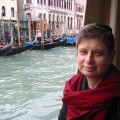Oscar Romero is a graduate student in the MA International Affairs at The New School. He is currently in his final semester, writing his thesis on Internet access in Cuba. In 2016, Romero and Magdiela Rivas (MA Non Profit Management candidate at The New School) began exploring international exchange programs in higher education, particularly in Latin America. Their work has led to development of a project aimed at investigating the impact of such programs.
The duo applied, and were selected, to participate at the Clinton Global Initiative University (CGIU) Meeting this year, where they will compete for a share of over $750,000 in funding for selected CGIU student projects. The CGIU is “a growing community of young leaders who don’t just discuss global challenges—they take real, concrete steps toward solving them. Throughout the year, and as a prerequisite to attending the meeting, students develop their own “Commitments to Action”: new, specific, and measurable initiatives that address pressing challenges on campus, in local communities, or around the world.” Romero and Rivera are slated to present their proposal at the CGIU Meeting at Northeastern University, Boston in October, 2017.
What follows is an interview with Oscar Romero, detailing his background and the trajectory of his work to date.

Why did you choose The New School?
I have been always fascinated by the potential of Information and Communication Technologies as tools for development (ICT4D). Over the last seven years, I have studied different aspects of ICT4D and Information Technology (IT) public policy, particularly in Latin America. Specifically, my research has centered around internet access, net neutrality, data sovereignty, telecommunications regulations and infrastructure development, the digital divides, and smart cities.
I chose the New School for its reputation as a the most progressive critical thinking hub in the United States, and was fortunate enough to be supported by scholarships from the New School and the University of Guadalajara in Mexico.
What spaces have opened up to you as a result of your research?
In March 2016, I was invited to present my research at the Inaugural Conference of the Science, Technology and Innovation series of the 5th National Congress of Social Sciences organized by the Mexican Council of Social Sciences (COMECSO) in Guadalajara.
Titled “Cyberspace and Internet access: a multidimensional process,” my presentation examined the multiple layers of the so called digital divide across Latin American countries, in an attempt to explore the geopolitics of cyberspace. Ultimately, I wanted to unmask naive interpretations that equate internet access to access to Social Networking Services such as Facebook or Twitter.
I shared the panel with the Dr Juan Carlos Barrón Pastor, PhD of UNAM, Dr Edit Antal, PhD of CISAN, Dr Analiese Richard, PhD of the University of the Pacific, Dr Jaime Preciado Coronado, PhD of the University of Guadalajara and Dr María de Lourdes Marquina Sánchez, PhD of the UANE.
Later that year, in December, I was invited by the Research Network on Autonomous Integration in Latin America and the Caribbean (REDIALC) to participate at their annual conference on Latin American Integration. I shared the panel with Dr Heriberto Cairo Carou, PhD of the Complutense University of Madrid, Dr Jaime Preciado Coronado, PhD of the University of Guadalajara, among other members of REDIALC. They asked me to discuss what Latin American Integration Processes (e.g. UNASUR and ALBA-TCP) had done to promote connectivity in the region. My presentation “Cyberspace integration in Latin America” focused on the telecommunication infrastructure developments promoted by the regional forums, particularly ALBA-1 and the South American fiber optic ring.
Coming out of that last conference, you were invited to contribute a chapter in a book. Can you talk a little bit more about that?
Every year, REDIALC publishes the Anuario de la Integración Latinoamericana y Caribeña, a compilation of articles on several areas of Latin American Integration. The publication, which publishes 25 to 35 articles each year, is financed by the Mexican National Council of Science and Technology. I was invited to submit my research for the newest compilation. I sent a paper entitled “The geopolitics of cyberspace in Latin America” which was accepted, and should be available soon.

You were recently selected to present some of your work at the Clinton Global Initiative University Meeting. What was your proposal?
Magdiela Rivas, a graduate student from the MA Non-profit Management Program at the New School, and I, are developing a framework to monitor and evaluate the impact of International Exchange Programs (also known as International Mobility programs) in higher education institutions, particularly in Latin America.Despite being in the early stages of developing our methodology, we have already begun working closely with several universities in Mexico and Argentina. We believe programs such as these could be key to reducing youth unemployment. However, first we need to promote a new paradigm for the management of International Mobility Programs that is rooted in measurable outcomes, rather than outputs and activities.
What are you hoping will be the long term impact of your project?
International Mobility Programs for students are heavily funded by national governments, universities and foundations around the world. We want to be able to increase and monitor the impact these programs have on students, whether that is measured by better employment, improved language skills, cultural exchanges, the creation of networks or knowledge sharing.
Ultimately, we want students to fully benefit from existing programs. However, for institutions to improve, they need to learn to build on previous decisions. We want to provide tools to contribute to that institutional learning process.
How has your time at TNS helped you to with all of your achievements? Any specific professors/courses you would like to shout out?
The New School has been, and continues to be, an incredible learning experience that has pushed me to explore new research and professional areas. In particular, the Cuba International Field Program (IFP) with Gabriel Vignoli, PhD and the Digital Equity Lab taught by Professor Maya Wiley, have both influenced my latest research on ICT4D.
Currently I’m working closely with Professor Mark Johnson through the Monitoring and Evaluation course to further develop the project for the CGI U Meeting.
 Oscar Romero is a Mexican-American in his final semester of the MA in International Affairs at The New School. He is the co-founder of the Education Services for International Development program and a member of the Research Network on Autonomous Integration in Latin America and the Caribbean. His work focuses on ICT4D initiatives, digital equity, cyber geopolitics and International Cooperation.
Oscar Romero is a Mexican-American in his final semester of the MA in International Affairs at The New School. He is the co-founder of the Education Services for International Development program and a member of the Research Network on Autonomous Integration in Latin America and the Caribbean. His work focuses on ICT4D initiatives, digital equity, cyber geopolitics and International Cooperation.
To find out more about the work of the SGPIA community, follow us on Twitter.




